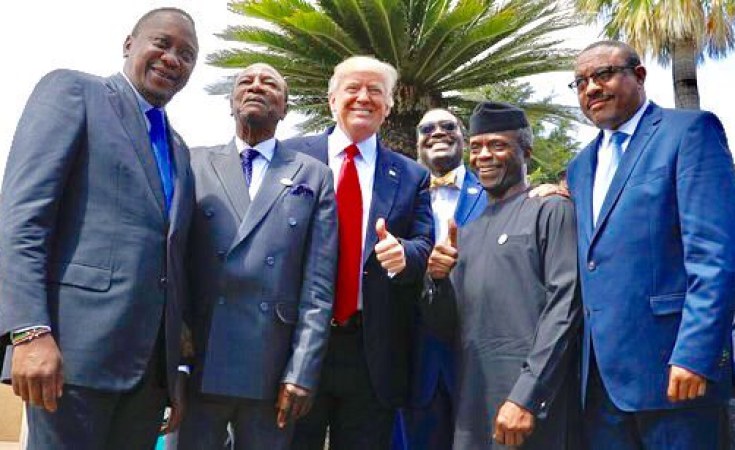Cape Town — President Donald Trump has included Chad in a new list of countries whose citizens are prohibited from entering the United States. But the ban placed on Sudanese travellers earlier this year has been ended.
In a proclamation issued on Sunday, he also retained Libya and Somalia on the banned list. The other nations now affected by the ban are Iran, North Korea, Syria, Venezuela, and Yemen.
The presidential proclamation said that although Chad's government is "an important and valuable counterterrorism partner of the United States", it does not share enough information to enable the U.S. to judge whether its citizens pose a threat to public safety.
"Additionally," President Trump added, "several terrorist groups are active within Chad or in the surrounding region, including elements of Boko Haram, ISIS-West Africa, and al-Qa'ida in the Islamic Maghreb."
The proclamation did not mention Sudan, but the Washington Post reported senior Trump administration officials as saying that Sudan's "cooperation on national security and information-sharing showed it was appropriate to remove it from the list".
Trump also named Libya as a valuable counter-terrorism partner but said the country faced "significant challenges in sharing several types of information, including public-safety and terrorism-related information necessary for the protection of the national security and public safety of the United States".
In Somalia's case, he said although the government met the U.S.'s requirements for sharing information, it was unable to give consistent and effective cooperation to the U.S. In addition, the "terrorist threat that emanates from its territory" presents special circumstances justifying a ban on immigrant visas.
However, unlike citizens of Chad and Libya, Somalis will be able to apply for "non-immigrant" visas – allowing for short-term family, tourism and business travel, subject to heightened scrutiny of visa applications.
Excerpts from portions of the proclamation relating to Chad, Libya and Somalia follow:
Chad
The government of Chad is an important and valuable counterterrorism partner of the United States, and the United States Government looks forward to expanding that cooperation, including in the areas of immigration and border management. Chad has shown a clear willingness to improve in these areas.
Nonetheless, Chad does not adequately share public-safety and terrorism-related information and fails to satisfy at least one key risk criterion. Additionally, several terrorist groups are active within Chad or in the surrounding region, including elements of Boko Haram, ISIS-West Africa, and al-Qa'ida in the Islamic Maghreb.
At this time, additional information sharing to identify those foreign nationals applying for visas or seeking entry into the United States who represent national security and public-safety threats is necessary given the significant terrorism-related risk from this country... The entry into the United States of nationals of Chad, as immigrants, and as nonimmigrants on business (B-1), tourist (B-2), and business/tourist (B-1/B-2) visas, is hereby suspended.
Libya
The government of Libya is an important and valuable counterterrorism partner of the United States, and the United States Government looks forward to expanding on that cooperation, including in the areas of immigration and border management.
Libya, nonetheless, faces significant challenges in sharing several types of information, including public-safety and terrorism-related information necessary for the protection of the national security and public safety of the United States. Libya also has significant inadequacies in its identity-management protocols.
Further, Libya fails to satisfy at least one key risk criterion and has been assessed to be not fully cooperative with respect to receiving its nationals subject to final orders of removal from the United States. The substantial terrorist presence within Libya's territory amplifies the risks posed by the entry into the United States of its nationals.
The entry into the United States of nationals of Libya, as immigrants, and as nonimmigrants on business (B-1), tourist (B-2), and business/tourist (B-1/B-2) visas, is hereby suspended.
Somalia
The Secretary of Homeland Security's report... determined that Somalia satisfies... information-sharing requirements... But several other considerations support imposing entry restrictions and limitations on Somalia.
Somalia has significant identity-management deficiencies. For example, while Somalia issues an electronic passport, the United States and many other countries do not recognize it.
A persistent terrorist threat also emanates from Somalia's territory. The United States Government has identified Somalia as a terrorist safe haven. Somalia stands apart from other countries in the degree to which its government lacks command and control of its territory, which greatly limits the effectiveness of its national capabilities in a variety of respects. Terrorists use under-governed areas in northern, central, and southern Somalia as safe havens from which to plan, facilitate, and conduct their operations.
Somalia also remains a destination for individuals attempting to join terrorist groups that threaten the national security of the United States. The State Department's 2016 Country Reports on Terrorism observed that Somalia has not sufficiently degraded the ability of terrorist groups to plan and mount attacks from its territory.
Further, despite having made significant progress toward formally federating its member states, and its willingness to fight terrorism, Somalia continues to struggle to provide the governance needed to limit terrorists' freedom of movement, access to resources, and capacity to operate. The government of Somalia's lack of territorial control also compromises Somalia's ability, already limited because of poor recordkeeping, to share information about its nationals who pose criminal or terrorist risks.
As a result of these and other factors, Somalia presents special concerns that distinguish it from other countries.
The entry into the United States of nationals of Somalia as immigrants is hereby suspended. Additionally, visa adjudications for nationals of Somalia and decisions regarding their entry as nonimmigrants should be subject to additional scrutiny to determine if applicants are connected to terrorist organizations or otherwise pose a threat to the national security or public safety of the United States.


